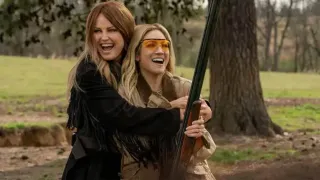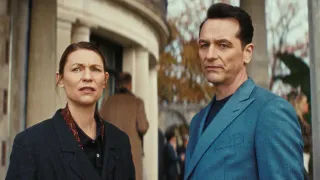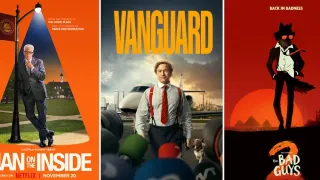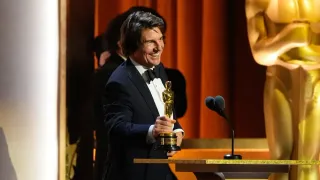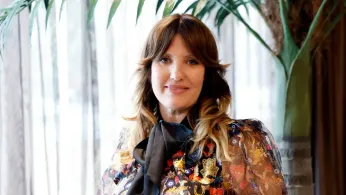
Sep 21
Creator Rebecca Cutter on the Queer Resonance of “The Hunting Wives”
READ TIME: 3 MIN.
Rebecca Cutter, the visionary creator behind Netflix’s “The Hunting Wives,” recently gave an in-depth interview to Out Magazine, offering insight into the creative process, audience reception, and the wider cultural significance of bringing sapphic narratives to mainstream television. The series, which has quickly become a sensation for its unapologetic embrace of queer themes, is being hailed as a “subversive, sapphic escape” and one of the most talked-about LGBTQ+ shows of the year .
Cutter discussed her intentional approach to centering queer women in her work, emphasizing the importance of “authenticity and visibility” for LGBTQ+ characters in contemporary storytelling. In her interview with Out Magazine, Cutter explained that she wanted to create a show where queer women could see themselves represented in complex, dynamic roles not defined solely by their sexuality. She noted, “It was important to me that the sapphic relationships in ‘The Hunting Wives’ were messy, passionate, and real—just like any other love story” .
This commitment to nuance is especially significant given the historical underrepresentation of queer women in mainstream media. By foregrounding LGBTQ+ experiences and challenging stereotypes, “The Hunting Wives” positions itself as both entertainment and social commentary, inviting viewers to question assumptions about gender, desire, and power.
One of the most notable takeaways from Cutter’s conversation with Out Magazine was her observation about the broad appeal of the series. While “The Hunting Wives” has found a devoted following among LGBTQ+ viewers, Cutter revealed that straight women have also been “curious and excited” by the show’s unapologetic queerness. She explained, “There’s a real curiosity from straight women about what it means to explore desire outside of heteronormative boundaries, and I think that’s part of why the show resonates so widely” .
This crossover appeal is testament to the universality of the themes explored in “The Hunting Wives”—including longing, secrecy, and the search for authenticity. The series has spurred conversations among viewers about sexual fluidity, the complexity of relationships, and the importance of creating space for multiple identities on screen.
Cutter’s interview also delved into the creative challenges of adapting bold, queer-centered content for a global streaming platform. She described her efforts to balance the need for dramatic tension with responsible, respectful storytelling, particularly given the show’s diverse audience. Cutter noted, “I was always aware of the responsibility that comes with representation. I wanted to avoid clichés and instead give viewers something that felt fresh and true” .
In discussing her inspirations, Cutter credited the growing landscape of queer media for paving the way for projects like “The Hunting Wives.” She cited shows that have broken ground in lesbian and bisexual visibility as motivating her to push even further in portraying the complexities of love and attraction among women .
“The Hunting Wives” arrives at a pivotal moment for LGBTQ+ representation in television, as networks and streaming platforms increasingly seek out stories that reflect the diversity and richness of the community. According to media analysts and LGBTQ+ advocacy groups, the growing demand for inclusive content is not only a matter of social justice but also a reflection of shifting audience demographics and viewing habits .
Cutter’s success with “The Hunting Wives” illustrates the potential for sapphic narratives to thrive when given the resources and creative freedom to break away from formulaic tropes. The series’ critical acclaim and strong ratings underscore the appetite for stories that speak to real-life experiences of LGBTQ+ people, rather than relegating them to supporting roles or token characters .
With the conclusion of “The Hunting Wives”’ first season, questions about the show’s future are top of mind for fans and critics alike. In recent interviews, including one with Variety, Cutter has hinted at plans for a potential second season, indicating that any continuation would remain rooted in the series’ commitment to honest, character-driven storytelling .
Advocates for LGBTQ+ media representation have praised Cutter’s work for its intersectional approach and willingness to tackle difficult subjects. Organizations such as the Human Rights Campaign and GLAAD have highlighted “The Hunting Wives” as evidence of meaningful progress in the industry, while also noting the need for continued vigilance in ensuring diverse voices are heard both on screen and behind the camera .
Rebecca Cutter’s interview with Out Magazine provides a revealing look at the motivations, challenges, and triumphs behind one of the year’s most compelling LGBTQ+ television series. By centering sapphic desire, embracing narrative complexity, and engaging broad audiences, “The Hunting Wives” stands as a testament to the power of inclusive storytelling—and the ongoing evolution of queer representation in popular culture .
